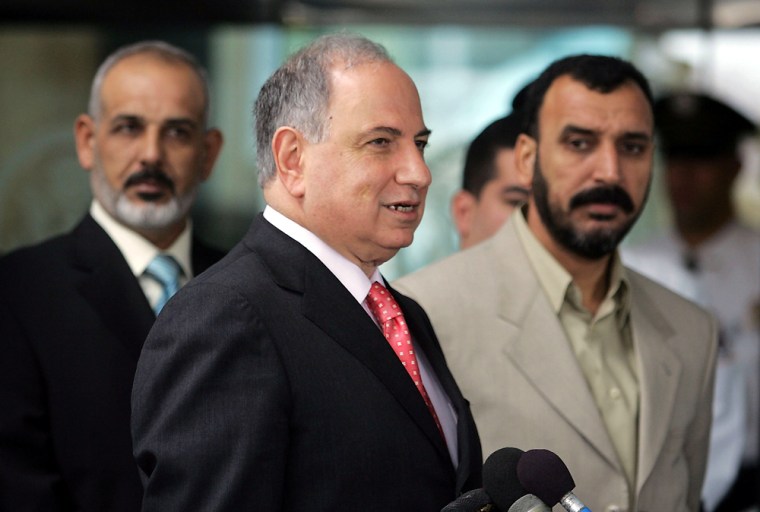Iraqi Deputy Prime Minister Ahmad Chalabi offered Wednesday to be questioned by the Senate on his role in prewar Iraq but refused to apologize for fueling allegations that Saddam Hussein had hidden caches of weapons of mass destruction.
Accorded a warm reception by the Bush administration, Chalabi lined up Vice President Dick Cheney and five Cabinet officers, including Secretary of State Condoleezza Rice and Secretary of Defense Donald H. Rumsfeld, for meetings this week and next.
Chalabi, whose reputation in Washington has soared, fallen and now revived, was welcomed by administration officials whom he briefed on Iraq’s reconstruction efforts, particularly on energy and financial issues.
But on Capitol Hill, Sen. Dick Durbin, D-Ill., and Rep. George Miller, D-Calif., urged the Senate and House intelligence committees to subpoena Chalabi regarding allegations that he provided false information about Saddam’s weapons and leaked U.S. secrets to Iran.
Sens. Durbin, Edward M. Kennedy, D-Mass., and Patrick J. Leahy, D-Vt., told Attorney General Alberto R. Gonzales that Chalabi should be sitting down with FBI investigators rather than meeting with Cabinet secretaries.
“Will the FBI interview Mr. Chalabi during his visit to the United States?” the senators asked in a letter. “If not, why not?”
Accused of leaking intelligence to Iran
And on the House side, Rep. Henry Waxman, D-Calif., wrote Rep. Christopher Shays, R-Conn., that if allegations that Chalabi leaked intelligence to Iran are true, he “has betrayed U.S. interests, caused incalculable damage to our national security and contributed to the death of more than 2,000 troops.”
Waxman asked Shays, who is chairman of a House national security subcommittee, to cancel a private briefing Thursday with Chalabi and instead hold a public hearing in which Chalabi would testify under oath.
At a news conference, Chalabi denied giving Iran information that compromised U.S. security.
But he said he had offered last year to be questioned, and added, “I am prepared to go the Senate and respond to questions.”
No apology for false information
At the same time, Chalabi refused to apologize for advising the Bush administration that Saddam had arsenals of weapons of mass destruction.
“We are sorry for every American life that was lost in Iraq,” he said. “As for deliberately misleading, this is an urban myth.”
In a 45-minute speech at the conservative American Enterprise Institute, Chalabi sketched a hopeful scenario for Iran’s economy, including a vast surge in oil production and eradication of corruption.
However, he said rebuilding Iraq’s security force was going slowly and U.S. and other troops should remain. He gave no timetable.
The Iraqi army, Chalabi said, had no more potent weapons than submachine guns while the country is surrounded by neighbors with large weapons arsenals.
Even while making senior administration officials available to Chalabi, the Bush administration appeared a bit self-conscious.
“It’s not up to us to pick the leaders of Iraq,” White House press secretary Scott McClellan said after announcing that Chalabi also would have access to Cheney and national security adviser Stephen Hadley.
Discussed energy, finance with Rice
For Rice, who met with him for about 30 minutes, it was an opportunity mostly to discuss energy and finance issues, which Chalabi oversees in Baghdad, said State Department deputy spokesman Adam Ereli. He said the administration has an interest in meeting with a wide range of Iraqi officials, of which Chalabi is only one.
“It was a good meeting. They had a wide-ranging discussion,” the spokesman said.
Chalabi said the meeting went “very well.” He brushed aside reporters’ questions regarding whether he had given the Bush administration misleading information before the war with Iraq.
“It’s more important to look to the future than to the past,” Chalabi said.
At the White House, spokesman McClellan said of Chalabi, “He is seen as an elected leader of the Iraqi government and one of a number that we have met with in recent months.”
“The Iraqi people are deciding their future, and they have a representative government that was elected by the Iraqi people,” McClellan said. “We are very supportive of helping the Iraqi people move forward and build a democratic future.”
On Capitol Hill, Democrats greeted Chalabi’s arrival by calling on Congress’ Republican-run intelligence committees to subpoena him to testify about his role in providing prewar information about Iraq that turned out to be false, and allegations that he may be linked to the leaking of sensitive U.S. secrets to Iran.
In a letter to the intelligence panels, Durbin and Miller said that rather than meeting with top administration officials, testimony to those committees “would be a more appropriate venue for an official meeting for Mr. Chalabi.”
